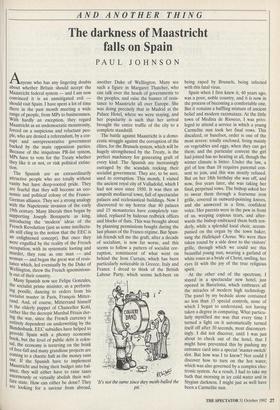AND ANOTHER THING
The darkness of Maastricht falls on Spain
PAUL JOHNSON
The Spanish are an extraordinarily attractive people who are totally without vanity but have deep-rooted pride. They are fearful that they will become an eco- nomic and political colony of the Franco- German alliance. They see a strong analogy with the Napoleonic invasion of the early 19th century. Many liberals then began by supporting Joseph Bonaparte as king, Introducing the 'modern' ideas of the French Revolution (just as some intellectu- als still cling to the notion that the EEC is an enlightened concept). But once they were engulfed by the reality of the French occupation, with its systematic looting and murder, they rose as one man — and woman — and began the great war of resis- tance which, led eventually by the Duke of Wellington, threw the French ignominious- ly out of their country. Many Spanish now see Felipe Gonzales, the socialist prime minister, as a perform- ing poodle, dancing to orders from his socialist master in Paris, Francois Mitter- rand. And, of course, Mitterrand himself is the elderly puppet of Chancellor Kohl, rather like the decrepit Marshal Main dur- ing the war, since the French currency is entirely dependent on underwriting by the Bundesbank. EEC subsidies have helped to provide Spain with a phoney economic book, but the level of public debt is colos- sal, the economy is teetering on the brink of free-fall and many grandiose projects are coming to a chaotic halt as the money runs out. If the Spanish have to implement Maastricht and bring their budget into bal- ance, they will either have to raise taxes enormously or virtually abolish their wel- fare state. How can either be done? They are looking for a saviour from abroad, another Duke of Wellington. Many see such a figure in Margaret Thatcher, who can talk over the heads of governments to the peoples, and raise the banner of resis- tance to Maastricht all over Europe. She was doing precisely that in Madrid at the Palace Hotel, where we were staying, and her popularity is such that her arrival brought the entire traffic of the city to a complete standstill.
The battle against Maastricht is a demo- cratic struggle against the corruption of the elites, for the Brussels system, which will be hugely strengthened by the Treaty, is the perfect machinery for generating graft of every kind. The Spanish are increasingly outraged by the scandals rocking their socialist government. They are, to be sure, used to corruption. This month, I visited the ancient royal city of Valladolid, which I had not seen since 1950. It was then an unspoilt mediaeval town, full of spectacular palaces and ecclesiastical buildings. Now I discovered to my horror that 40 palaces and 15 monasteries have completely van- ished, replaced by hideous redbrick offices and blocks of flats. This was brought about by planning permissions bought during the last phases of the Franco regime. But Span- ish friends tell me the graft, after a decade of socialism, is now far worse, and this seems to follow a pattern of socialist cor- ruption, reminiscent of what went on behind the Iron Curtain, which has been particularly noticeable in Greece, Italy and France. I dread to think of the British Labour Party, which seems hell-bent on `It's not the same since they moth-balled the pit.' being raped by Brussels, being infected with this fatal virus.
Spain when I first knew it, 40 years ago, was a poor, noble country, and it is now in the process of becoming a comfortable one. But it remains a baffling mixture of ancient belief and modern razzmatazz. At the little town of Medina de Rioseco, I was privi- leged to attend a service in which a young Carmelite nun took her final vows. This discalced, or barefoot, order is one of the most severe: totally enclosed, living mainly on vegetables and eggs, when they can get them; and the particular convent the girl had joined has no heating at all, though the winter climate is bitter. Under the law, a girl of less than 18 requires parental con- sent to join, and this was stoutly refused. But on her 18th birthday she was off, and now, five years later, she was taking her final, perpetual vows. The bishop asked her to swear them through a fearsome iron grille, covered in outward-pointing knives, and she answered in a firm, confident voice. Her parents were in the, pew in front of us, weeping copious tears, and after- wards the bishop embraced them both ten- derly, while a splendid local choir, accom- panied on the organ by the town baker, sang the Hallelujah Chorus. We were then taken round by a side door to the visitors' grille, through which we could see this beautiful young nun, wearing a garland of white roses as a bride of Christ, smiling, her eyes lit with the joy of the true religious spirit.
At the other end of the spectrum, I stayed in a spectacular new hotel, just opened in Barcelona, which embraces all the miracles of modern high technology. The panel by my bedside alone contained no less than 15 special controls, none of which I began to understand, not having taken a degree in computing. What particu- larly mystified me was that every time I turned a light on it automatically turned itself off after 30 seconds, most disconcert- ingly. I did not discover, until I was just about to check out of the hotel, that I might have prevented this by pushing my entrance card into a special 'master-switch' slot. But how was I to know? Nor could I discover how to turn on the hot water, which was also governed by a complex elec- tronic system. As a result, I had to take my bath that morning in icy cold water and in Stygian darkness. I might just as well have been a Carmelite nun.


























































 Previous page
Previous page